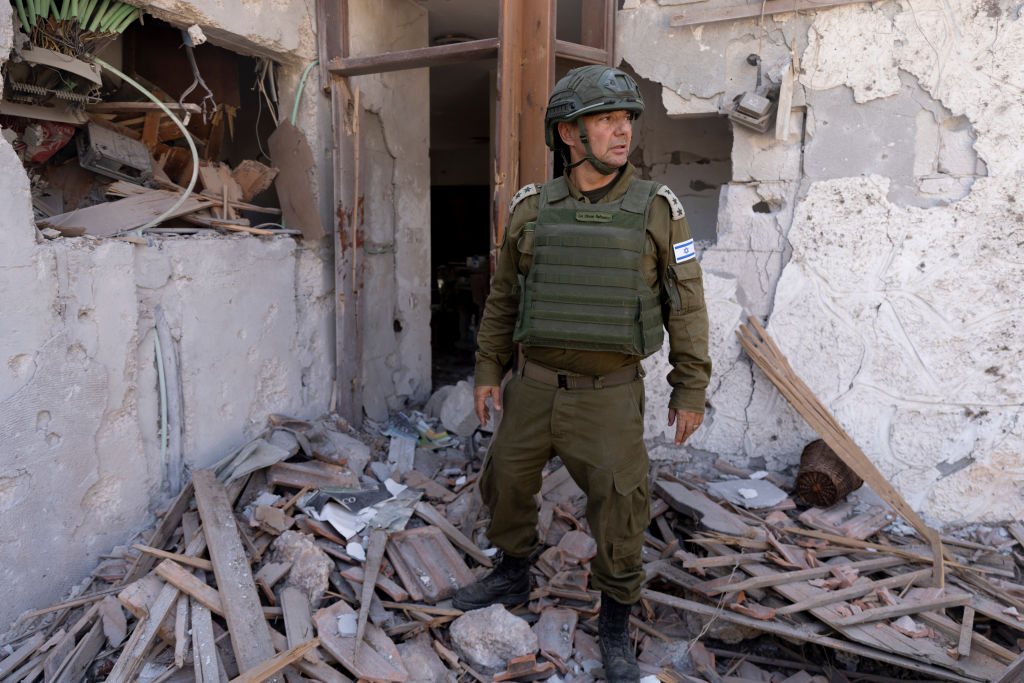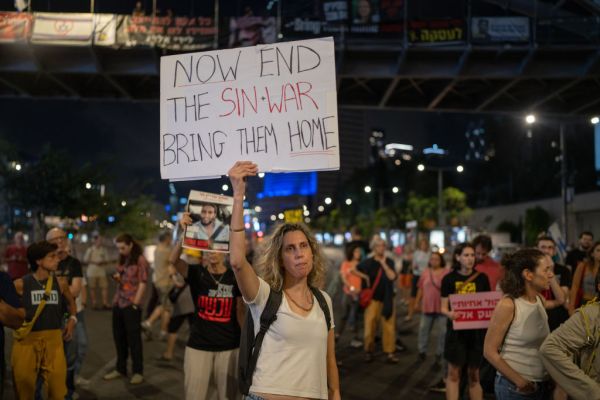Happy Tuesday! If you ever feel like technology is running way ahead of you, we invite you to be reassured by the fact that Tim Cook, the CEO of Apple, was unaware that iMessage users name their group chats.
Quick Hits: Today’s Top Stories
- Israeli authorities last month arrested seven Israeli citizens suspected of spying for Iran over the course of two years, Israeli prosecutors said Monday. The ring reportedly carried out some 600 missions—including surveilling Israel Defense Forces (IDF) installations, Iron Dome batteries, and critical infrastructure—for Iranian handlers through a Turkish intermediary in exchange for hundreds of thousands of dollars, including some delivered in cash by Russian tourists.
- Secretary of State Antony Blinken traveled to the Middle East on Monday—his 11th trip to the region since the October 7, 2023, attacks. His visit, which includes a stop in Israel, marks another effort to secure a ceasefire-for-hostages deal between Israel and Hamas following the death of the terrorist group’s leader, Yahya Sinwar, last week. Also on Monday, the IDF carried out heavy airstrikes in and around Beirut on targets it said were connected to Hezbollah’s financial infrastructure. The IDF had issued evacuation warnings to civilians to avoid branches of Al-Qard Al-Hassan, an unlicensed bank that facilitates Hezbollah’s financing.
- U.S. Secretary of Defense Lloyd Austin visited Kyiv on Monday in his third wartime trip to the Ukrainian capital, where he announced a $400 million military aid package that includes ammunition, armored vehicles, and other equipment as he tried to signal continuity in support for the war-torn country ahead of November’s U.S. presidential election. Austin did not announce any policy changes that would have allowed Ukraine to use U.S.-provided weapons to strike far beyond Ukrainian borders, though Ukrainian President Volodymyr Zelensky tweeted Monday that the pair had discussed the topic.
- An Indian official said Monday that India and China had reached an agreement over patrols along their disputed border region four years after a deadly skirmish there left relations between the two nuclear powers strained. The details of the new arrangement were unclear—and remain unconfirmed by Beijing—but the notional agreement precedes a meeting of the leaders of the BRICS grouping in Moscow this week, which could potentially include a bilateral discussion between Indian Prime Minister Narendra Modi and Chinese President Xi Jinping.
- Turkish cleric Fethullah Gülen—whom the Turkish government accused of plotting a short-lived 2016 coup against Turkish President Recep Tayyip Erdoğan—died in a hospital in Pennsylvania on Sunday at the age of 83. The religious leader who began as an ally of Erdoğan later criticized the Turkish president as an authoritarian and spent the last 25 years of his life in self-imposed exile in the United States. Gülen denied any involvement with the 2016 coup and the U.S. refused to extradite him to Turkey, despite the Erdoğan government’s requests.
- A House of Representatives task force investigating the first assassination attempt against former President Donald Trump in Butler, Pennsylvania, in July released its interim report on Monday, finding that the shooting was “preventable and should not have happened.” The conclusions from the House task force—led by GOP Rep. Mike Kelly of Pennsylvania—echo those of the executive branch panel report released last week, including highlighting significant communications breakdowns and failures by law enforcement to approach the shooter, Thomas Matthew Crooks, at any point after he was identified as acting suspiciously. The task force has until mid-December to release its final report.
- The U.S. Navy on Sunday announced the deaths of the two naval aviators who went missing after their fighter jet crashed during a routine training flight near Mount Rainier in Washington state last week. The plane’s wreckage was discovered in a remote, heavily wooded area near Mount Rainier on Wednesday, but the search for the remains of the pilots—identified on Monday as Lt. Cmdr. Lyndsay P. Evans and Lt. Serena N. Wileman—is still underway. The cause of the crash is under investigation, the Navy said.
A Unifying Podcast for Divided Times

Confronting a Post-Sinwar Reality

Just hours before the massacre of October 7, 2023—when Hamas fighters launched a surprise attack into Israel that indiscriminately killed 1,200 civilians and soldiers—their leader and the mastermind of the attack went underground. Literally. Yahya Sinwar, the commander of Hamas in Gaza, was caught on video entering the terrorist group’s vast tunnel network with his two young sons and his wife, who was carrying what appears to be a $32,000 Hermès Birkin handbag.
Sinwar would live in hiding for most of the next year, constantly moving from safehouse to safehouse as the Israel Defense Forces (IDF) hunted him. But last Wednesday, he met his end—not at the hands of a pinpoint airstrike or sophisticated commando operation like those that have killed so many of Israel’s enemies over the course of the war.
Instead, soldiers on a routine patrol while training to be squad leaders happened to bump into three unidentified Hamas fighters in Gaza. After a firefight, one terrorist fled to the upper floor of a nearby building. The IDF soldiers used a drone to determine his location before directing fire from a tank at the structure, which collapsed. The next morning, a follow-up patrol noticed that the man half-buried in rubble resembled Israel’s public enemy No. 1. DNA testing later confirmed it was Sinwar.
But what does Sinwar’s death—celebrated across Israel and even by some Palestinians—mean for the war? Is Hamas defeated? Is Israel any closer to recovering Hamas’ remaining hostages? And is the end of the war, now also underway in Lebanon, finally …
As a non-paying reader, you are receiving a truncated version of The Morning Dispatch. Our 1,275-word item on Gaza after Sinwar is available in the members-only version of TMD.
Worth Your Time
- A memo from a young CIA analyst sparked the first impeachment of former President Donald Trump. Was it worth it? “In the half decade since his complaint kicked off a political firestorm, the analyst has declined all requests to speak publicly about his actions, even as he has reckoned privately with whether they made a difference,” Greg Jaffe reported for the Washington Post. “He sometimes wondered whether his complaint and the impeachment that followed had accomplished anything of lasting import. The complaint had made it impossible for him to continue as a CIA analyst, and had put his life, and the lives of people he loved, at risk. Meanwhile, the lesson Trump seemed to take from his first impeachment acquittal was that no one could rein him in; that his power was almost unfettered, the analyst said. A second impeachment, in 2021 for inciting the Jan. 6 riots and the storming of the U.S. Capitol, also ended in acquittal and only seemed, in the analyst’s view, to embolden him further.”
- For NOTUS, Oriana González chronicled the decline of the pro-life Democrat. “Democratic Sen. Bob Casey has described himself in the past as a ‘pro-life Democrat,’” she reported. “He has voted for a Donald Trump-backed federal 20-week abortion restriction and once said Roe v. Wade should be overturned. But this week, a leading abortion rights group endorsed him for the first time. … And with that endorsement, the era of the ‘pro-life Democrat’ in Congress is practically over. … Casey’s about-face on abortion rights mirrors that of Democrats around the country and is perhaps one of the clearest signs that holding an anti-abortion rights position is a difficult one to maintain in the party. There have been three paths for anti-abortion Democrats in the last decade: retire, lose reelection or change positions.”
Presented Without Comment
The Hill: Trump Compares Image of Butler Assassination Attempt to Iwo Jima Photo
Also Presented Without Comment
Reuters: Woman Who Threw Banana Milkshake at UK’s [Reform Party Leader Nigel] Farage Pleads Guilty to Assault
In the Zeitgeist
We have no idea what business a fried chicken company has producing a children’s show, but Chick-fil-A seems to know since it’s setting one loose on the world on November 18—along with an app it’s billing as a “digital playground.”
Toeing the Company Line
- It’s Tuesday, which means Dispatch Live (🔒) returns tonight at 7 p.m. ET/4 p.m. PT! Steve and the team will discuss the news of the week and, of course, take plenty of viewer questions! Keep an eye out for an email later today with information on how to tune in.
- In the newsletters: Kevin argued (🔒) that American voters are acting like babies and politicians are allowing it, the Dispatch Politics crew covered a conspiracy-laden Elon Musk town hall, and Nick warned (🔒) of a coming American identity crisis if Trump retakes the White House.
- On the podcasts: Sarah and David preview Election Night and how it might play out in the courts on Advisory Opinions.
- On the site: Our election symposium continues with an installment on regulatory policy, Joseph Roche reports from Ukraine on how troops are thinking about the U.S. election, and Stirewalt opines on the GOP being big on vibes.













Please note that we at The Dispatch hold ourselves, our work, and our commenters to a higher standard than other places on the internet. We welcome comments that foster genuine debate or discussion—including comments critical of us or our work—but responses that include ad hominem attacks on fellow Dispatch members or are intended to stoke fear and anger may be moderated.
With your membership, you only have the ability to comment on The Morning Dispatch articles. Consider upgrading to join the conversation everywhere.